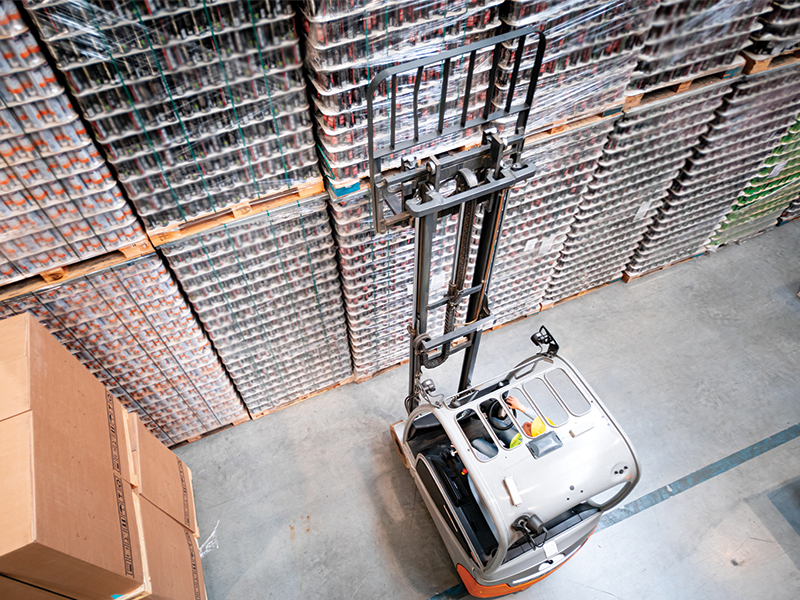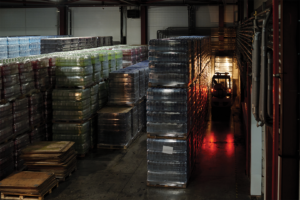
Optimizing Aluminum Can Handling in Beverage Production
The food and beverage industry, particularly the can sector, has faced its fair share of challenges over the past few years. Global disruptions such as the COVID pandemic, evolving consumer behaviors, and the unforeseen closures of can converting plants, have put significant pressure on the can supply network worldwide.
Areas of risk in storage and transportation
Empty can manufacturing, a year-round enterprise, traditionally sees an accumulation of stock during the colder months. This stockpiling ensures that there is ample supply ready for the summer, when demand typically skyrockets. However, this approach can sometimes backfire. Storing large quantities often means that can pallets are shifted multiple times – first from the can plant to external storage facilities and later from these warehouses to beverage production sites. These frequent movements, compounded by processes like forklift operations and truck loadings, pose a substantial risk. Every transfer is a potential point where an empty can may get damaged.

The Contribution of COVID
The pandemic also added another layer of complexity. As some facilities ran short of cans, they had to source them from far-off locations, sometimes even from different continents. Such extended transit routes naturally came with their own set of issues – longer travel times and, inevitably, more handling points. Both of which increased the risk of damage.
Can pallets, especially their corners, are notoriously prone to damage during horizontal movements. This can happen during stacking, retrieval, or truck loading. Properly training warehouse staff and forklift operators is therefore vital. It’s our first line of defense against unnecessary losses. However, even if cans make it to the depalletizing phase, damaged ones might still slip through. While line operators might catch and remove some, others might escape notice, and if these cans end up on the filling line, the problems compound.
The internal coating of a can is crucial. If a can arrives damaged, this coating may crack or break. When such a can is subsequently filled under counter pressure, its shape might seem restored, but the internal damage remains. The beverage inside may then corrode the unprotected area, eventually leading to leaks during distribution. Bent or damaged cans can cause jams in the filler or seamer which lead to additional losses and stoppage time.
Addressing the Issue of Can Integrity
So, how do production plants tackle this issue? Monitoring a high-speed production line, which can process millions of cans daily, is no small feat. Let’s not even start on the challenges posed by towering storage spaces and the need for drivers to identify the right pallets amidst a sea of labels.
It’s clear that an intensive and continuous training program is paramount. Food and beverage facilities must prioritize and invest in training their teams to handle cans with the utmost care. Newer facilities can employ empty can inspection systems to eliminate damaged cans from the line, but the can loss remains. By training and working with their can supplier and partner logistics companies, they can minimize damage, maintain the quality of their products, and ensure consumer satisfaction in an ever-competitive market.
Joe Norris
Product Development and Technical Service
Joe Norris boasts a career spanning over four decades in the packaging development arena. Serving for ten years at SmartSkin Technologies in Fredericton, Canada, he’s an expert in Packaging Development and Technical Service. Prior to this, Joe held pivotal roles at The Coca-Cola Company, both as Principal Engineer for Global Packaging R&D in the Greater Atlanta Area and earlier as a Packaging Engineer in Atlanta and London. His keen insights have influenced early concept ideation, design, and engineering, with a particular emphasis on the commercialization of North American aluminum bottles and their resealable closures.
Joe’s journey also includes a 15-year tenure at Colgate Palmolive Co in New York City and Piscataway, New Jersey. Initially, he championed package engineering leadership for top US brands, notably playing a key role in the successful launch of Total toothpaste in 1997. Later, he spearheaded a team advancing global brand and package technology innovation, securing the Global Technology Award in 2001 for dual tube commercialization.
A testament to his innovative spirit, Joe has an impressive portfolio of 18 issued patents with both Colgate-Palmolive and The Coca-Cola Company. His remarkable contributions to the industry underline his expertise and commitment to packaging, development and manufacturing.


